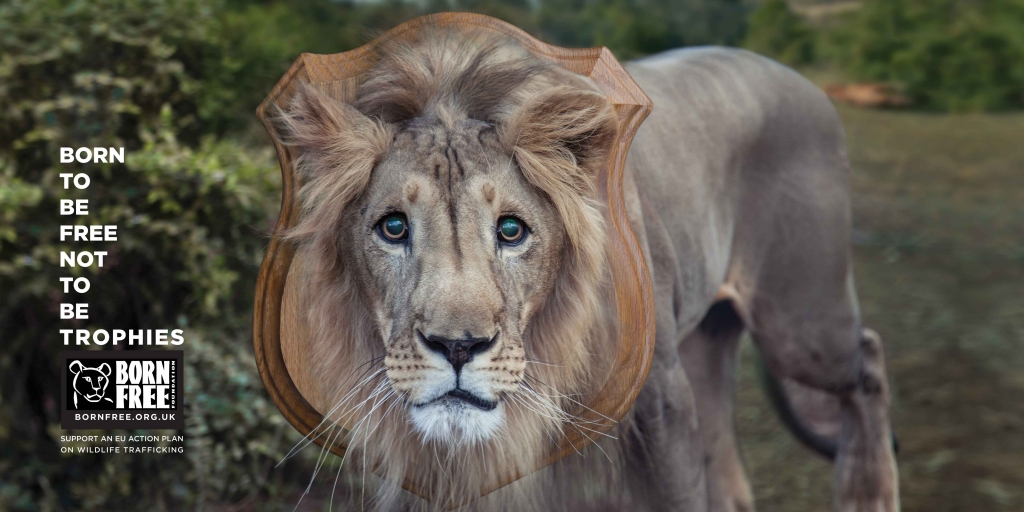
Born Free Bewildered By BBC Decision To Broadcast Trophy Shockumentary
International wildlife charity, Born Free, is deeply shocked and saddened that the BBC will broadcast wildlife ‘shockumentary’ Trophy as part of BBC Storyville on BBC4 at 9pm on Monday 29th January 2018.
Born Free believes that Trophy – released in UK cinemas last November and made in association with the BBC – is a misguided, one-sided view of trophy hunting that totally fails to present the facts. It also, and importantly provides a platform for, John Hume, Africa’s biggest rhino rancher to promote his vision of a legal international trade in rhino horn without offering viewers any sense of the risks and very real dangers of doing so.
Born Free President and Co-Founder, Will Travers OBE, who briefly appears in Trophy, said: “The public trusts documentaries broadcast by the BBC and, particularly, those financed by or made in association with the BBC. They are the gold standard because they are considered and balanced. That trust could be undermined by Trophy because it is peppered with assumptions and assertions that go forward without challenge and are offered in an almost fact-free environment.
“Storyville claims it has a ‘proud tradition of showcasing the very best in international film-making’. We, therefore, urge the BBC to commission a documentary that will present the true facts for and against trophy hunting, and that will properly examine both sides of the rhino horn trade argument.”
Born Free wrote to Mandy Chang, Commissioning Editor of BBC Storyville and Acquisitions, setting out its many concerns. Her response stated that, while noting Born Free’s concerns, “it is important to understand that this is a documentary and not a current affairs piece. I think people in the film reveal their agendas through their actions and I feel the film does reflect the different voices in the debate.”
If only that were the case. For example, in Trophy, Safari Club International Foundation President, Joe Hosmer, unchallenged, states: “That elephant hunt sold for $50,000 and that money will all go into conservation.” In fact, at best, only a fraction of that $50,000 will be used for conservation, and independent research suggests that, on average, just 3% of what trophy hunters pay for their bloody ‘sport’ reaches local communities.
On the rhino horn trade issue, John Hume, unchallenged, states: “If you are anti-trade, then you are anti-legal trade…if you are anti-legal trade then, by implication, you are pro-illegal trade – and those are the poachers.” This disgusting remark is deeply offensive to the many conservationists, such as the late Wayne Lotter, and countless rangers who protect some of the world’s most iconic wild animals from poachers. They are not pro-illegal trade, and more than a thousand have lost their lives in the last 10 years protecting rhino, elephant and other species from poachers on behalf of us all.
Will Travers added: “Trophy will leave viewers in tears of despair, anger and outrage. Watch out for the following: If you want to see what killing an elephant is really like, then tune in. If you want to watch numerous animals’ lives wasted in one selfish man’s lamentable efforts to secure a lion trophy, then tune in. If you want to see a beer-swilling, foulmouthed hunter shoot a captive crocodile just so that his wife can have a new bag, shoes and belt, then tune in. And if you want to watch one of the most potentially dangerous ideas for the ‘conservation’ of rhino, then listen to John Hume, unchallenged, justify his approach to rhino ranching and the opening up of international sale of rhino horn to markets in the Far East.”
Born Free is wholly opposed to the killing of animals for fun, whether they are wild-born or bred in captivity, and believes the great majority of compassionate people utterly reject trophy hunting too. It has been working to bring the brutality of this so-called ‘sport’ to the attention of policymakers, enforcement bodies, and the public, for many years. Ongoing efforts include attempting to persuade countries that still allow trophy hunting to restrict or ban the practice. Born Free also focuses on countries from which most trophy hunters emanate, by calling for tighter restrictions, and ultimately complete bans, on the importation of animal ‘trophies’. For further information, see http://www.bornfree.org.uk/campaigns/further-activities/trophy-hunting/
Born Free believes that allowing a legal trade in rhino horn would send the wrong message to potential consumers, increasing demand and opening up new markets. This is exactly the scenario that occurred in 2008 when legal sales of over 100 tonnes of ivory to China and Japan led to a massive and ongoing spike in elephant poaching (as revealed by Hugh Fearnley-Whittingstall in the BBC’s Saving Africa’s Elephants: Hugh and the Ivory War). Since legally-obtained horn could never hope to fulfil this demand, poaching would escalate and the legal trade would provide a method by which cut-price illegal horn could be laundered into trade. For further information, see http://www.bornfree.org.uk/get-involved/past-events/why-the-rhino-horn-trade-ban-needs-to-stay/
More from Born Free Foundation
- Born Free launches Wildlife Heroes
- Born Free launches appeal to rehome King the lion cub to South African sanctuary
- New report highlights South African governments role in the bloody, commercial lion body part trade
- Born Free reacts to Channel 4 documentary Britains Polar Bear Cub
- Trouble at the Zoo Born Free calls for overhaul of UK zoo licensing and inspections

 8 years ago
8 years ago  2221 views
2221 views